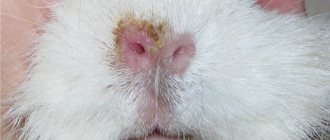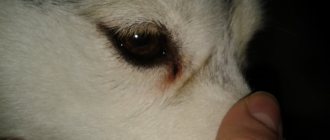Why does your Yorkie cough and how to help him?
Yorkshire terriers are small dogs and, due to the structure of their faces, periodically frighten their owners with a characteristic cough. In this case, the Yorkie coughs as if she was choking and may even grunt slightly. This is a physiological phenomenon and should not frighten the owner. The fact is that the structure of a dog’s muzzle is somewhat different from other breeds. Hence the occurrence of periodic suffocation, which causes a coughing attack. At the same time, a complete feeling is created that the dog is choking and trying to regurgitate something.
Causes of cough in Yorkshire Terrier
But not only the structure of the muzzle can cause coughing in Yorkies.
Yorkies can cough for a variety of reasons.
Among the most common conditions that cause the development of kennel cough are the following:
Sometimes Yorkies manage to sneeze in the opposite direction, i.e. inside the pharynx. The condition can be triggered by a strong emotional shock - the joy of meeting the owner - or a lump of hair getting into the nasopharynx.
Important. Such a cough does not threaten the dog with anything dangerous. The attack passes in just a few minutes and the worst thing it can end with is that the Yorkie will vomit the swallowed fur.
Frequent coughing attacks require the dog owner's attention. In this case, the pet must be taken to the vet immediately. Only a specialist will be able to establish an accurate diagnosis and select an appropriate treatment for the condition.
Brachycephalic syndrome in Yorkies, Spitz, and Toy Terriers
Coughing is not uncommon in miniature dogs.
And if suddenly your pet begins to make fits of abrupt or deep humming sounds when exhaling, especially debilitating at night, this is a signal that he is seriously ill. A cough can be a symptom of many health problems. Shih Tzu, Pekingese, and pug are breeds that belong to the group of brachycephals, dogs with a shortened skull, and have a natural predisposition to it. Their flattened muzzle with a short nose is the culprit for suffering from snoring and a specific cough, which can begin at 3-4 months. In addition, such a reflex act tends to intensify in warm, humid weather.
- the physiological factor does not require treatment, but for preventive purposes it is necessary to exclude situations that provoke coughing: stress, feverish conditions, high physical activity;
Internal parasites - worms. There are several types of helminths: roundworms, tapeworms and flukes.
Symptoms of a Yorkie with worms are often similar to those of food poisoning. Often the dog is worried and grabs itself with its teeth in the anus area.
If you suspect your Yorkie has worms, you need to seek help from a veterinarian, as it is necessary to accurately determine the type of helminths. Expulsion of worms should be carried out exactly as prescribed by the doctor. Under no circumstances should you change the dosage yourself, as a small dose may be ineffective, and a large dose may be fatal for the dog.
You should not get carried away with prescribing antihelminthic drugs to adult dogs without having evidence that the dog is actually infected with helminths, without knowing which ones exactly. When fighting tapeworms, you should take into account the period of their development and repeat the course of expelling parasites within the time frame specified by the veterinarian.
The cause of helminth infections in Yorkie puppies can be intrauterine infection, if the bitch was not dewormed before mating, violation of feeding and maintenance rules, worm eggs can be carried by fleas and other external parasites.
Helminth infections are very dangerous for Yorkshire Terrier puppies. A large accumulation of helminths in the intestines can cause intestinal obstruction or even intestinal rupture. All helminths secrete toxic substances that can cause allergies and immune disorders.
More details
A Yorkie's cough is most often associated with severe hypothermia, but can be infectious in nature. A special viral disease that has been observed quite often lately is the so-called “kennel cough”, which most often affects dogs that are in close contact. Instillation of interferon into the nose, as well as antibiotics (Biseptol and ampicillin) very quickly cure a Yorkie's cough. Usually the disease resolves without complications.
Inflammation of the ear canal (otitis). Most often it occurs when water or a foreign body gets into the ear. An advanced case may be inflammation of the middle ear. If left untreated, otitis may become protracted. Treatment must be prescribed by a doctor.
Sign of inflammation: the dog shakes its head, scratches its ears, purulent discharge and an unpleasant odor from the ear may be observed. Otitis media is very painful for a dog, so see a doctor at the slightest sign of illness.
More details
I know that this topic has already been discussed, but ours is a little different.
2 months ago my Yorkie (soon 2 years old, large-4.5 kg, boy) started coughing
At first they didn’t attach any importance to this, since it was unusual, but in the end, after two weeks, they decided to take him to the doctor (do a blood test and x-ray)
sent us to a cardiologist (we haven’t gone yet because we’re waiting for us to stop giving aminophilin, and carrying him in the car when he feels bad and he’s coughing for now, we’re afraid) because his heart is enlarged
some compactions in the lungs, the analysis showed the overall level of leukocytes at the upper limit of normal, but at the same time some of the indicators are significantly elevated - the conclusion is that inflammation is occurring
as a treatment - cough syrup, mucaltin 3 times a day tablet dissolved in a teaspoon, a quarter of euphyllin 2 times a day, half ampicillin 3 times a day.
We give everything 5-6 days, but there is no improvement. the dog lost his voice. he barks very low since childhood, but at first the barking became high-pitched, and then disappeared completely, he tries to bark, it is clear that he is unpleasant and only makes wheezing
has a runny nose, snores at night and generally makes wheezing sounds
keep taking medicine
The question is, have we been prescribed the right treatment and what to do next? (our doctor, whom we trust immensely, but still, says that we need to continue giving antibiotics for up to 10 days, and mucaltin and syrup can be given for so long - up to six months - until everything goes away with the cough).
We suggest you read: Black feces in cats: causes and treatment. Cat food for sensitive stomach
The dog is sick for the first time in two years, so I’m stressed ((((
plus another small question: how could he catch the infection if he was vaccinated?
Thank you very much for your help.
More details
Coughing in dogs is a fairly common reason for visiting a veterinary clinic.
To find out the causes, the animal undergoes a series of examinations, allowing not only to make the correct diagnosis, but also to prescribe adequate treatment. During diagnosis, it is very important to distinguish between problems associated with the respiratory system and various cardiac pathologies.
The main diseases that cause cough include: pathologies of the upper respiratory tract - laryngitis, farengitis, tracheitis and narrowing of the trachea - collapse.
Diseases of the lower respiratory tract also lead to coughing: acute, chronic bronchitis, pneumonia.
Laryngitis and laryngopharyngitis are accompanied by cough. as well as lethargy, loss of appetite, enlarged lymph nodes, loss of voice and can be caused by various infectious agents (adenovirus infection), mechanical pressure on the wall of the pharynx (foreign body), prolonged continuous barking (stay in the kennel), ingestion of cold food, water, snow, collar pressure, etc.
Diseases of the trachea are accompanied by a dry, paroxysmal cough, shortness of breath, and stridor breathing. These include infectious tracheitis, tracheal bronchitis of a parasitic nature, viral (kennel cough), bacterial etiology (Bordetella bronchiseptica). Tracheitis can also be caused by mycoplasmas. mushrooms, etc.
Non-infectious diseases of the trachea include narrowing of the trachea -
- intratracheal obstruction (foreign bodies, tumors, granulomas, abscesses, polyps);
- extratracheal compression (tumors, enlargement of the thyroid gland, lymph nodes, dilatation of the esophagus, abscesses, hematomas);
— congenital hypoplasia of the trachea (English bulldogs, Boston terriers);
- local tracheal stenosis (congenital, consequence of injury).
RESPIRATORY TRACT DISEASES
ACUTE BRONCHITIS - often accompanied by pneumonia.
An important symptom is a strong, paroxysmal, wet cough, which manifests itself against the background of the dog’s general well-being. The onset of an attack is typical upon waking up, inhaling a large volume of fresh air and swallowing accumulated mucus.
More details
Pets cough for so many reasons. Some of them are very minor, and some of them are life-threatening. A cough can happen, for example, either due to water entering the larynx when drinking, or without external causes, if this is the first sign of serious problems with the heart or lungs. Below are the most common causes of cough in pets, but not all.
How does a veterinarian determine the cause of a cough?
When asking owners about their animal's cough, the conversation starts with the same questions every time. Doctors call this anamnesis. Does the dog really cough? What breed of dog? How long does the animal cough? What age is your pet? Is the cough hard and dry, or wet and productive with expectoration of sputum?
When does an animal cough the most, when the dog is active or does the cough occur while resting or lying down? Is your pet becoming lethargic or more depressed than usual? Is the problem seasonal? Does the animal also sneeze and have nasal discharge? When was the dog last examined and what was discovered? Is your pet gaining weight or losing weight? Any other changes you have noticed in your pet?
These questions provide a basis to begin investigating the causes of the cough.
Examination of the gums reveals whether they are pale or bluish or if there are ulcers or bleeding.
Your pet's tonsils need to be checked. Enlarged tonsils often cause coughing. Inflamed eyes and a dry, crusty nasal mucosa often accompany kennel cough, while massage of the animal's trachea causes coughing with tracheitis, tracheal collapse, and tumors in the tracheal area.
Checking the pet's neck will also reveal whether it has an abnormal pulse, whether it is present in the jugular vein, and the pet's abdomen should also be examined to detect fluid, an enlarged liver or spleen, which would indicate a cough associated with heart failure.
But not only the structure of the muzzle can cause coughing in Yorkies.
Yorkies can cough for a variety of reasons.
Among the most common conditions that cause the development of kennel cough are the following:
- the presence of foreign objects in the dog’s respiratory tract (nose and throat), and then the dog coughs, as if something is stuck in the throat - hysterically, to the point of nausea;
- sharply formed paralysis of the laryngeal muscles;
- tracheal collapse – occurs quite often in Yorkies;
- tumors localized in the upper respiratory tract;
- sneezing in the opposite direction is not dangerous for the dog;
- cardiac pathologies, in particular those caused by the presence of parasites in the organ;
- diseases of the respiratory system - bronchi and lungs;
- nasopharynx injury.
We suggest you read: How often should you feed a puppy?
Sometimes Yorkies manage to sneeze in the opposite direction, i.e. inside the pharynx. The condition can be triggered by a strong emotional shock - the joy of meeting the owner - or a lump of hair getting into the nasopharynx.
Important. Such a cough does not threaten the dog with anything dangerous. The attack passes in just a few minutes and the worst thing it can end with is that the Yorkie will vomit the swallowed fur.
Frequent coughing attacks require the dog owner's attention. In this case, the pet must be taken to the vet immediately. Only a specialist will be able to establish an accurate diagnosis and select an appropriate treatment for the condition.
Symptoms that indicate a pathological cough
In order not to miss the onset of a serious illness, your Yorkie must be closely monitored.
With a pathological cough, the dog opens its mouth wide, and its body temperature changes.
The following symptoms will indicate the development of pathology to the owner:
If such symptoms develop, the dog must be urgently shown to a veterinarian.
Treatment of pathological cough in Yorkies
Only a doctor can determine the true cause of cough in Yorkies. The prescribed therapy will depend on the final diagnosis.
When your pet is diagnosed with a classic cold, he will be prescribed various symptomatic medications. The doctor will select the dosage regimen and dosage. If you follow all the recommendations, your Yorkie's cough will go away quite quickly and without developing serious consequences.
If foreign objects are detected in the dog's respiratory tract, the doctor can remove them. Doing this yourself is highly not recommended, since the owner can injure the nasopharyngeal mucosa and worsen the general condition of the pet.
If your Yorkie starts coughing, you should take him to the veterinarian.
Sometimes the cause of a hysterical cough and snoring is the presence of a serious heart pathology in a Yorkie. In some cases, it can be provoked by a parasite that has settled in the heart muscle. A dog can get it from a mosquito bite. An ultrasound examination of the heart, as well as additional tests, will help confirm the diagnosis and select adequate therapy.
But the most common disease in Yorkies is tracheal collapse. If pathology develops, it will not be possible to avoid the development of coughing and wheezing that accompanies the breathing process. If the disease is detected in the early stages, it responds quite successfully to conservative therapy, but in advanced cases, surgery can help the dog.
Causes of coughing attacks in Yorkies
We have already described the first reason: the structure of the muzzle is similar to other dogs. Now let's discuss the rest:
1. A foreign object enters the dog’s respiratory tract. This process is accompanied by a hysterical cough, with bouts of vomiting. 2. Upper respiratory tract paralysis characteristic of this breed. 3. Such a common phenomenon as tracheal collapse. 4. Tumor phenomena in the upper respiratory tract. 5. A common occurrence for this breed of dog, but not at all dangerous, is sneezing in the opposite direction. 6. Heart pathologies due to the possible presence of parasites and helminths in the Yorkshire Terrier’s body. 7. Diseases of the lungs and bronchi. 8. Trauma to the nasopharynx.
This is important to know! Reverse sneezing is very common among Yorkies, but is completely harmless. This can happen due to an emotional outburst or fur getting into the throat.
A coughing attack provoked by this reason goes away on its own; the only thing it can provoke is a one-time urge to vomit.
However, if your pet suffers from frequent coughing attacks, you should urgently show it to a specialist, that is, a veterinarian. Only he will be able to correctly determine the cause and prescribe the appropriate treatment.
Character of the cough
Coughing in a pet is a very common and completely normal occurrence. Not all experienced dog breeders immediately sound the alarm if a dog coughs or even chokes. In this case, many provide first aid or closely monitor the animal’s actions to make sure that the dog is not in danger.
To recognize a natural cough and distinguish it from an alarming one, you need to understand how dogs cough.
If your dog starts coughing suddenly, it is likely that the cough was caused by damage to the mucous membrane from dry air. In addition, the mucous membrane can be damaged by solid food (stale dry food, bones). In this case, the irritation goes away on its own, and after 2-3 days the dog stops coughing.
There are also a number of other reasons that can cause this phenomenon. And if the four-legged cough is protracted, then it is advisable to contact an experienced veterinarian.
Cough caused by a virus
It appears due to the destruction of the respiratory tract by viruses. Viral cough in a dog occurs quite often, because the pet can run in cold weather or come into contact with other dogs.
What viral ailments can manifest in a four-legged friend are provided below.
Cold. Appears as a result of cold drinking or eating ice cream, swimming in cold water, which can result in the pet becoming hypothermic. Symptoms of a common acute respiratory infection are inflammation of the tonsils. The dog begins to cough, thus trying to get rid of bacteria that irritate the throat.
Treatment: give the dog a warm drink, insulate the pet’s habitat, walk less in the cold air and create all the comfortable conditions so that the pupil gets better. If the measures taken do not help, and the four-legged dog continues to suffer from lethargy, then you need to contact a veterinary clinic.
Adenovirus - transmitted from other dogs by airborne droplets. Often manifested by the following symptoms:
Treatment: for a mild form of the disease, you can get by with home treatments, for example, keeping the dog in a warm place and not letting it out for a walk until it is completely cured. You also need to create a light diet and add vitamins to your food. If the cough does not go away, then switch to drug therapy prescribed by your veterinarian.
Tracheobronchitis is another common ailment that often affects dogs.
Signs of illness:
If you notice such phenomena, you should immediately contact an experienced specialist. The disease cannot be cured at home.
Pneumonia – occurs due to severe hypothermia or lack of treatment for inflammation of the respiratory organs.
What may be an indicator of the disease:
The disease is a dangerous form, so it is not subject to self-medication. It is worth seeking advice from a veterinarian.
Sore throat - manifested by inflammation of the tonsils, as well as the following symptoms:
Treatment by an experienced veterinarian is inevitable. In this case, therapy is often limited to taking antibacterial agents. If complications are observed, the tonsils can be removed surgically.
The dog is coughing as if it was choking: what to do and how to help?
Coughing is a reflex that helps clear the airways. This manifestation of the body occurs not only in people, but also in four-legged pets. For example, a dog may cough frequently for no apparent reason.
And this does not always indicate that your pet child has health problems. Unfortunately, our four-legged friends cannot tell us what exactly is bothering them.
Therefore, let’s take a closer look at what to do if your dog coughs as if he’s choking.
Character of the cough
Coughing in a pet is a very common and completely normal occurrence. Not all experienced dog breeders immediately sound the alarm if a dog coughs or even chokes. In this case, many provide first aid or closely monitor the animal’s actions to make sure that the dog is not in danger.
To recognize a natural cough and distinguish it from an alarming one, you need to understand how dogs cough.
If your dog starts coughing suddenly, it is likely that the cough was caused by damage to the mucous membrane from dry air. In addition, the mucous membrane can be damaged by solid food (stale dry food, bones). In this case, the irritation goes away on its own, and after 2-3 days the dog stops coughing.
There are also a number of other reasons that can cause this phenomenon. And if the four-legged cough is protracted, then it is advisable to contact an experienced veterinarian.
What causes a cough and how to treat it
Why does my dog cough like he's choking?
Depending on what can cause such disorders, there are many types of cough. All of them have specific symptoms and require special therapy.
Let's look at what causes a dog to cough, as if he was choking.
Cough caused by a virus
It appears due to the destruction of the respiratory tract by viruses. Viral cough in a dog occurs quite often, because the pet can run in cold weather or come into contact with other dogs.
What viral ailments can manifest in a four-legged friend are provided below.
Cold. Appears as a result of cold drinking or eating ice cream, swimming in cold water, which can result in the pet becoming hypothermic. Symptoms of a common acute respiratory infection are inflammation of the tonsils. The dog begins to cough, thus trying to get rid of bacteria that irritate the throat.
Treatment: give the dog a warm drink, insulate the pet’s habitat, walk less in the cold air and create all the comfortable conditions so that the pupil gets better. If the measures taken do not help, and the four-legged dog continues to suffer from lethargy, then you need to contact a veterinary clinic.
Adenovirus - transmitted from other dogs by airborne droplets. Often manifested by the following symptoms:
- wet or dry cough;
- vomiting;
- increased body temperature;
- shortness of breath;
- drowsiness.
Treatment: for a mild form of the disease, you can get by with home treatments, for example, keeping the dog in a warm place and not letting it out for a walk until it is completely cured. You also need to create a light diet and add vitamins to your food. If the cough does not go away, then switch to drug therapy prescribed by your veterinarian.
Tracheobronchitis is another common ailment that often affects dogs.
Signs of illness:
- sneezing more often than usual;
- cough accompanied by white foam.
If you notice such phenomena, you should immediately contact an experienced specialist. The disease cannot be cured at home.
Pneumonia – occurs due to severe hypothermia or lack of treatment for inflammation of the respiratory organs.
What may be an indicator of the disease:
- nausea;
- regurgitation of white foam;
- rapid breathing;
- heat;
- fatigue.
The disease is a dangerous form, so it is not subject to self-medication. It is worth seeking advice from a veterinarian.
Sore throat - manifested by inflammation of the tonsils, as well as the following symptoms:
- The dog actively imitates swallowing movements.
- Vomiting.
- The dog was coughing, as if he was choking.
Treatment by an experienced veterinarian is inevitable. In this case, therapy is often limited to taking antibacterial agents. If complications are observed, the tonsils can be removed surgically.
Cough when swallowing a foreign body
If your dog cannot clear his throat, as if he is choking, it is possible that he has swallowed a small object. What to do:
- Hold the dog's muzzle and open its mouth with your hands.
- If the foreign object is located shallowly and is noticeable in the throat, then you can try to pull it out yourself. This procedure is done with tweezers or fingers.
- If the object is not noticeable in the throat, then you need to urgently call a veterinarian. Independent actions can lead to the fact that a small body can go even deeper.
To accurately determine that a pupil is choking, you need to carefully observe his actions and how the dog coughs:
- The pet begins to actively swallow for no reason.
- Frequently licks his nose.
- A gag reflex appears.
In this case, if the dog is coughing as if he is choking, treatment will not be appropriate. Therefore, you urgently need to remove the object that provokes the cough.
Cough with heart disease
Sometimes four-legged friends cough and gag due to heart failure. In addition to a pronounced cough with foam, the following also appear:
- lethargy;
- drowsiness;
- labored breathing;
- the animal breathes through its mouth, as if it is suffocating;
- loss of appetite.
If such symptoms are detected, you should immediately conduct a diagnosis in a veterinary laboratory and visit a specialist. The veterinarian will prescribe treatment and give advice on what to do for the next heart attack.
Cough caused by the presence of parasites
No less dangerous is a cough as if the dog is choking and cannot clear its throat. What to do with such a symptom is not always clear, because often the cause of such a cough is the existence of worms in the arteries of the heart. This phenomenon is called “dirofilariasis” and is manifested by the following symptoms:
- shortness of breath;
- fainting;
- severe hoarse cough;
- swelling of the animal's limbs.
Home therapy cannot get rid of parasites, so you need to visit a doctor and follow his recommendations.
Cough due to tracheal collapse
This phenomenon is chronic and can be congenital. For a long time, collapse can be asymptomatic, but then it can manifest itself in not very pleasant relapses:
- Vomiting when drinking or eating.
- Loss of appetite.
- Heavy breathing.
- A hacking cough.
This disease is easier to treat at the initial stage of development. The veterinarian prescribes dietary supplements. In advanced collapses, the disease is eliminated through surgery.
Cough as an allergic reaction
A dog, like a person, often suffers from allergies, which can provoke a cough. Common causes of allergic cough include:
- Eating food with ingredients that are not tolerated by the dog’s body.
- Seasonal allergies.
- Selection of incorrect treatment and low-quality medications.
To eliminate this phenomenon, you need to determine the root cause of the cough and eliminate it: give up unsuitable medications, switch to high-quality food, give your pet a remedy for seasonal allergies, following the instructions of a specialist.
As you can see, coughing in dogs occurs due to a variety of conditions in the pet’s body. And if you cannot independently determine the cause of this phenomenon, then you can always go to a professional.
Source: https://aboutanimals.ru/zdorove-sobak/kashel-u-sobaki.html
Cough when swallowing a foreign body
If your dog cannot clear his throat, as if he is choking, it is possible that he has swallowed a small object. What to do:
To accurately determine that a pupil is choking, you need to carefully observe his actions and how the dog coughs:
In this case, if the dog is coughing as if he is choking, treatment will not be appropriate. Therefore, you urgently need to remove the object that provokes the cough.
Cough caused by the presence of parasites
No less dangerous is a cough as if the dog is choking and cannot clear its throat. What to do with such a symptom is not always clear, because often the cause of such a cough is the existence of worms in the arteries of the heart. This phenomenon is called “dirofilariasis” and is manifested by the following symptoms:
Home therapy cannot get rid of parasites, so you need to visit a doctor and follow his recommendations.
Cough as an allergic reaction
A dog, like a person, often suffers from allergies, which can provoke a cough. Common causes of allergic cough include:
To eliminate this phenomenon, you need to determine the root cause of the cough and eliminate it: give up unsuitable medications, switch to high-quality food, give your pet a remedy for seasonal allergies, following the instructions of a specialist.
As you can see, coughing in dogs occurs due to a variety of conditions in the pet’s body. And if you cannot independently determine the cause of this phenomenon, then you can always go to a professional.
Education University: Moscow State Academy of Veterinary Medicine. Year of graduation: 2010. Specialty: Veterinary medicine, Veterinary medicine. Experience I have experience working in a veterinary clinic for more than 7 years. Experience of the Federal State Budgetary Institution "All-Russian State Center for Quality and Standardization of Medicines for Animals and Feed"
Source
Types and symptoms of kennel cough
Classification of cough can be carried out based on different criteria:
- Duration : acute (10-12 days) and chronic (over 2 months).
- The intensity is a slight cough and with anguish.
- By “sound” – barking, hoarse, chesty, with wheezing, without sound.
The most common typology is the division of cough into dry and wet, based on the presence of discharge. Cough accompanies many illnesses. Therefore, assessment and diagnosis are carried out in the totality of all symptoms.
Common to all types of cough in dogs is the mechanism of its occurrence:
- Short inhalation, reflex contraction of the laryngeal muscles,
- Spasm of the abdominal muscles;
- Opening of the glottis;
- Exhalation.
The dog is coughing as if choking, trying to regurgitate something
Cough is a protective reaction of the body when foreign objects or substances enter the lungs. It clears the trachea, clearing the way for air. Occasional coughing in dogs is natural and harmless. But regular repetition of a symptom may indicate a serious illness in the animal.
The dog is coughing as if choking, trying to regurgitate something
Causes of cough
The causes of cough in dogs can be external, mechanical, or internal in nature.
Mechanical injuries include cases where an animal has swallowed a foreign body, as well as chest injuries.
Internal factors of occurrence represent a broad group. In these situations, cough is a secondary symptom and develops against the background of the underlying disease. Among the most common are:
- Allergic reactions;
- Acute tracheobronchitis;
- Cardiovascular diseases;
- Pneumonia;
- Infections, worms.
The main types of cough in dogs and its causes
In some breeds, coughing and wheezing sounds appear due to the structural features of their respiratory system (pugs, bulldogs, griffons).
In some cases, a dog may start coughing due to stress - a sudden change of environment or owner, fear.
In other cases, the manifestation of this symptom signals health problems.
Aviary
Aviary cough is a viral phenomenon that is transmitted from one animal to another by airborne droplets. Typically, signs of the disease appear 2-14 days after infection.
Dogs in common enclosures, at exhibitions and competitions, in nurseries, and in foster care are at risk. This type of cough indicates the development of diseases such as laryngotracheitis and tracheobronchitis.
Signs of aviary (kennel) cough:
It may appear after an active walk, physical activity, or training.
Typical environment for the spread of kennel cough
If kennel cough is not treated promptly, it can develop into more serious illnesses such as pneumonia.
Pneumonia
In addition to the previous factor, the development of pneumonia is also influenced by fungi and liquids or food debris that accidentally enter the respiratory organs.
X-ray of the lungs to determine pneumonia in a dog
In addition to these signs, the following are present:
Pneumonia is much easier to prevent than to cure.
Cordial
A cough can also occur if a weak heart muscle puts pressure and interferes with the functioning of the respiratory system. In such cases, it meets the following criteria:
Listening to a Dog's Heart to Determine Causes of Cough
Outwardly, it seems that the dog is trying to cough or burp something, sometimes swallowing air or opening its mouth, as if it does not have enough oxygen.
Parasitic
Appears as a result of ingestion of parasite larvae. From the digestive system, parasites gradually enter the bronchi, irritating them and causing coughing:
Diagram of how parasites enter a dog's body
Cough can cause tracheobronchitis.
Oncological
It is a consequence of the appearance of a cancerous tumor on the bronchi or heart muscle.
Oncological formations on the mucous membranes of a dog
On a note! In oncology, the cough is constant, sometimes incessant.
Allergic
It is seasonal (spring-summer). It can be caused by severe allergies: flowers, food, chemicals, especially those protecting against ticks.
Allergic cough can be easily distinguished from other types by other accompanying allergy symptoms:
Rashes are a concomitant allergic symptom
Your body temperature may also increase.
Entry of foreign objects
Possibly in case of swallowing food too quickly or with diseases of the central nervous system. When a foreign object gets into the mucous membranes of the respiratory tract and irritates them, the dog begins to cough non-stop.
The dog is choking and trying to cough up
The action is complemented by sneezing, an attempt to burp, spit out the irritant, and possibly nausea or vomiting.
Tracheal collapse
A disease that occurs predominantly in small breed dogs. It is especially often observed in unruly animals on a leash, which the owners have to pull or pull back. As a result, the fragile trachea becomes deformed or damaged.
Schematic representation of tracheal collapse
There is a regular cough with symptoms:
The dog may cough even while eating or drinking.
Video - About coughing in dogs
The video answers questions about the types of cough and its signs in various diseases.
Viral respiratory diseases in Yorkies and Spitz
Unvaccinated puppies and dogs with weak immune defenses are more often susceptible to respiratory infections during contact, especially at shows. Otherwise, this type of cough is called kennel cough.
- herbal cough medicines;
- warm milk with honey;
- irrigating the throat with antimicrobial drugs;
- vitamins;
- bronchodilators and antibiotics if infectious tracheobronchitis or pneumonia develops;
We suggest you read: Pimples (acne) in cats - symptoms, treatment, medications, causes
The main thing is not to start the process and start treatment on time.
How to treat a cough?
Making a correct diagnosis of cough is impossible without an experienced veterinarian. The owner’s answers to the following questions will also help to recognize the symptoms:
After measuring body temperature and appropriate diagnosis, the doctor prescribes the required treatment regimen.
Nursery
Treatment for enclosure cough involves setting aside a warm, dry corner for the animal with sufficient ventilation, but without drafts. The pet must be at rest.
Diagnosis and treatment of kennel cough
It is better to give the latter only in cases of exacerbation that develops into pneumonia, since antibiotics also have a negative effect on the dog’s body.
On a note! In some cases, aviary cough goes away on its own, but it cannot be left without treatment, since the symptom threatens to become chronic.
Cordial
Since cardiac cough manifests itself due to complications in the functioning of the circulatory system and its organs, an important condition is treatment of the root cause of the disease.
To make coughing easier for your dog, you can give him emollients and expectorants.
Important recommendations are to follow a proper diet and regular, feasible physical activity.
Parasitic
The first thing you need to do is get tested to determine the type of parasite. After this, the doctor prescribes a remedy aimed directly at removing helminths from the body.
The best deworming medications for dogs
It is believed that after their successful removal, the cough also stops.
Oncological
In most cases, it is extremely difficult to cure a cancerous tumor in a dog. But her condition can be alleviated by taking the following medications:
The last 2 substances are especially useful in removing constantly accumulating mucus and blood clots inside the bronchi, which make breathing difficult.
Allergic
It is urgent to find out the cause of cough and other allergic symptoms in order to remove the allergen from the field of direct influence on the animal.
Antihistamines for dogs
To calm and relieve symptoms, prescribe:
Collision with the irritant must be minimized, ideally eliminated completely.
Entry of foreign objects
Without a professional veterinarian, owners are unlikely to be able to help the animal remove the irritant from the respiratory tract. It is necessary to consult a doctor immediately when signs appear, since over time the animal begins to choke.
What to do if your dog is choking
The main mistake in such cases is adding a laxative, which will only worsen the situation.
Tracheal collapse
Only a veterinarian can diagnose changes in the tracheal passage. He is able to change its shape and size during surgery.
Video - Dog coughing as if he was choking
How are coughing attacks treated?
We would like to remind you once again that self-medication can lead to life-threatening consequences for the animal, so this matter should be entrusted to a veterinarian. Only he, after examining and identifying the cause, will be able to prescribe adequate treatment.
So, for example, if the cause of the cough is a common cold, then the specialist will prescribe medications that fight all the symptoms. With the correct dosage and compliance with the doctor’s instructions, your Yorkie will feel improvements very soon.
If the cough is caused by a foreign object, the veterinarian will easily remove it. Be careful not to carry out this procedure at home yourself, otherwise there is a high probability of damage to the mucous membranes of the pharynx. We have already said that the cause of cough can be heart pathologies, which are associated with the presence of parasites in the heart muscle. Ultrasound examination and additional tests can detect this disease.
However, the most common cause is tracheal collapse. Indeed, if this pathology develops, it is impossible to avoid coughing and wheezing when breathing. If this disease is detected in the early stages, then your pet will be prescribed medication, but in advanced cases, only surgery can help.
Cough prevention
Treatment of cough as an independent syndrome or a sign of a disease requires a lot of physical and time expenditure. Some diseases can be cured in 2-4 weeks, others cannot be completely cured.
It is much easier to prevent coughing by following general recommendations for protecting your dog's health:
Regular inspection
The animal must be periodically examined for the presence of certain signs characterizing health:
It is necessary to visit the veterinarian periodically
Attention! If at least one of the parameters is not normal, you should consult a doctor.
Visit to the veterinarian
Regular visits to a specialist are a normal preventative measure for dog owners, since it is sometimes impossible to independently determine the disease.
The minimum time to visit a veterinary clinic is twice a year, the optimal time is once a season.
Vaccination
Most diseases can be avoided by regularly vaccinating your animal. Vaccines will help protect your pet from the following cough diseases:
Vaccinations must be carried out regularly
In some cases, vaccination can be carried out at home independently, but the corresponding entry must appear in the dog’s passport.











